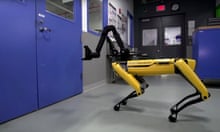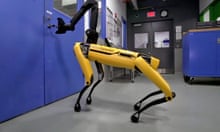The future has already arrived in a small factory in Worcester, according to the man hired by Theresa May to put Britain at the forefront of the next industrial revolution.
Juergen Maier, the chief executive of Siemens UK, believes new technologies including robotics, artificial intelligence and additive manufacturing, or 3D printing, can deliver greater productivity and create more highly paid jobs.
But failing to crack the next revolution will come at a high price: falling living standards. The work being done in Worcester, and places like it, will be crucial if Britain is to be successful outside the EU, Maier says. The starting gun has been fired in this global race and Britain needs to get ahead.
“The beauty of it is, if we get this right, it doesn’t just drive productivity, but it also means that you’re driving jobs up the value chain, which means that people are getting better paid, so ultimately you raise living standards,” the 53-year-old says from the factory floor of Materials Solutions, which is 85% owned by Siemens and boasts big-name clients such as Rolls-Royce.
“If you take it as an average, our living standards have hardly risen since the recession. The fundamental reasons are we’re not exporting enough, and we’re not driving productivity and output. Unless you’re driving productivity, you can’t raise wages.”
Maier, a firm supporter of the remain campaign in the run-up to the EU referendum, has quickly become the go-to expert on the future of British industry. When he met the Guardian, he was preparing to appear on BBC1’s Question Time in Wigan, alongside panellists including the Brexit secretary, David Davis, and the Ukip leader, Paul Nuttall.
His brief as head of the industrial digitalisation review commissioned by the government is to work out how can the UK can better deliver existing technologies, how it can create new industries and, in doing so, whether the UK can generate a net increase in manufacturing jobs despite greater levels of automation. “Our gut feeling is we can, but we still need to prove that,” Maier says.
“The absolute nightmare for me would be that we’re applying this technology, we’re displacing jobs as a result of it – which will happen – but what we’re not doing at the same time is creating all the jobs in computer science, in data analytics, in software code writing. The good news is we already have a lot of jobs in this area. These industries will create thousands of jobs, software jobs, engineers.”
With much at stake, the review is a major undertaking for Maier, but he does have support from a panel of UK business leaders including Sir Charlie Mayfield, the chairman of John Lewis Partnership, and Carolyn Fairbairn, the director general of the CBI. The current plan is to report back with initial recommendations to the business secretary, currently Greg Clark, in late summer.
Maier’s ambition for the UK is considerable but so too are the obstacles, not least the uncertainty created by Brexit and strong competition from the likes of Germany and the US. Another key issue will be Britain’s ability to fill these highly skilled roles in sufficient numbers post-Brexit.
“It is not going to be as good as it was in the single market and I think we just have to be more honest about that,” Maier says. “I’m not a moaner or a ‘remoaner’, I’m saying we have to get to grips with the realities, which are that there are going to be some barriers to trade. And the sooner we accept that the better.
“Once we’ve got over the heat over the elections and this slight hysteria that we’ve got at the moment, we have to get into a period of calm.”
On Materials Solutions’ factory floor in Worcester, 3D printing machines whirr quietly away, making complex metal parts for industries including automotive, aerospace and motor sports with a speed that would have been unthinkable using traditional manufacturing. Here, welding and forging are replaced with machines that turn 3D CAD models into parts using software, lasers and metal powders.
For Siemens, the firm has delivered breakthrough technology, by 3D printing gas turbine blades. In doing so, the time it takes from the design of a new blade to its production has been reduced from two years to just two months.
Founded and run by Carl Brancher, Materials Solutions employs 23 people and is the perfect example of how Britain can create new, cutting-edge industries, according to Maier.
The Siemens boss believes the prize for the winner in the next industrial revolution is considerable: a thriving manufacturing sector, highly paid, skilled jobs and greater productivity, which would in turn fuel growth and raise living standards for all.
Britain has some advantages, Maier says, including a flexible, skilled workforce and existing infrastructure that fosters innovation such as the UK’s Catapult centres, the Alan Turing Institute in London and the Henry Royce Institute in Manchester.
Besides, he says, we have no choice but to win the race to industrial digitalisation: there is too much at stake to fail. “We have no option. We have to pull this off and if we don’t pull it off, our living standards will drop further.”









